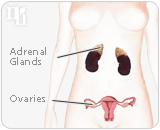When you think about your hormones and menopause, the first thing that usually comes to mind is estrogen, followed quickly by progesterone. Well, there is one other hormone in the body that has a serious impact on your menopausal symptoms. It may come as a shock to you, but it is testosterone. Usually hailed as the male hormone, testosterone plays just as important of a role in women's bodies as it does men's. Although women's bodies produce much less of this hormone than a man's, it does not mean that it does not perform an important role in women's bodies when going through menopause. If you are confused about what the testosterone in your body is actually doing, continue reading to learn the ABC's of testosterone.
Testosterone and Your Libido

When it comes to your sex drive, you have testosterone to thank for it. Testosterone keeps your libido up, while helping keep your body's functions that are necessary for sex in excellent shape. When you lose your libido during menopause, it is not only because there is a drop in estrogen levels, but testosterone levels as well.
In women, a little bit of testosterone can go a long way; it enhances sexual desires and fantasies, helps women become sexually aroused more easily, allows them to better enjoy intercourse, and have more frequent orgasms.
How Testosterone Works

A woman's body produces testosterone in the ovaries and the adrenal glands. A multi-talented hormone, testosterone boosts both libido and energy, maintains muscle mass, strengthens bone, and ensures that the nipples and clitoris are sensitive to sexual pleasure. As women age, their bodies produce less testosterone, estrogen, and progesterone.
Low Levels of Testosterone
By the age of 40, women produce half as much testosterone as they did in their earlier years. These levels inevitably drop further with the onset of menopause, or if a woman has her ovaries removed. Many believe that the low energy levels, decreased sexual desire, and mood swings that many women experience during menopause are directly related to declining levels of testosterone, not just estrogen.
If you would like to learn more, click on the following link to find out about other natural hormones that are in play while your body is going through menopause.


